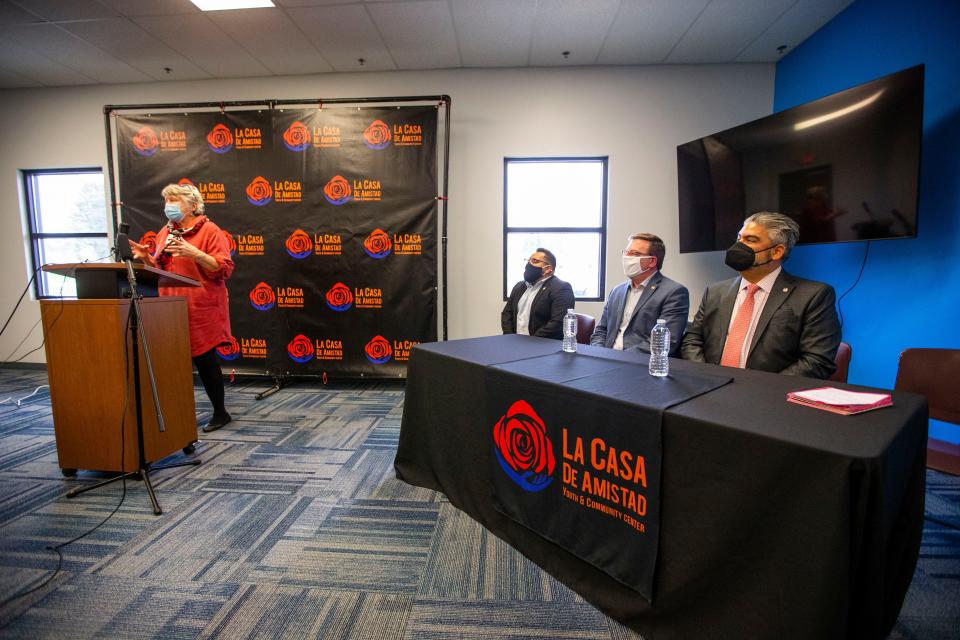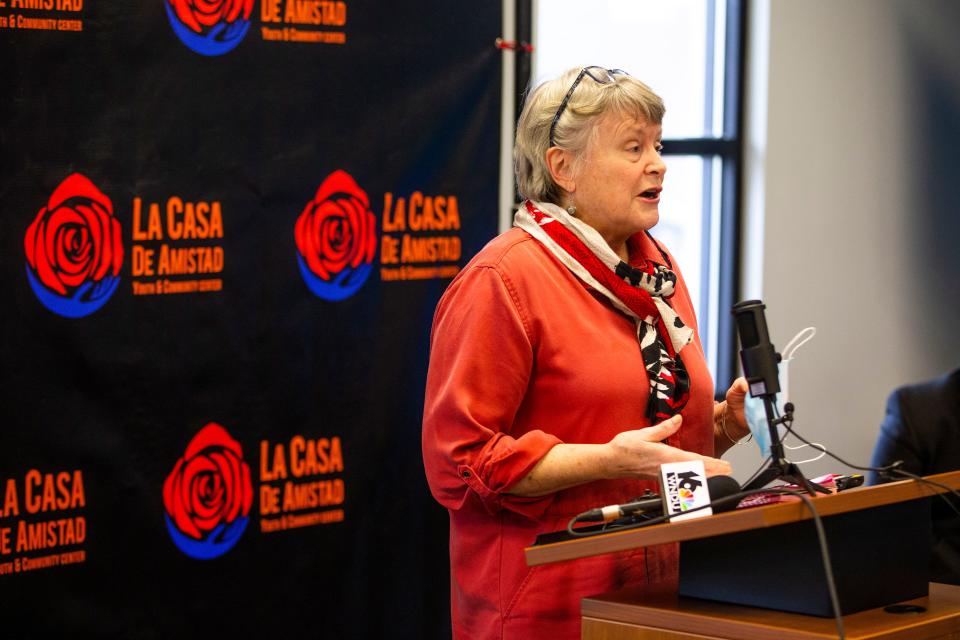Group helping Afghan refugees granted $100,000 to pay for legal aid, basic services
SOUTH BEND — An Afghan man stood wearing gray sweatpants and open-toed sandals outside of a conference room in La Casa de Amistad. Two attorneys who have been working to affirm his status as an asylum-seeker had brought him to witness the city's announcement that it will offer money to bolster their work.
But he had just finished talking on the phone with his family back in Afghanistan. When he thinks of his wife and his 10 children who are living in peril under the Taliban, the stress he felt before departing in a U.S. aircraft in late August rushes back to his head.

"Believe me, every day when I was in Afghanistan, I (had a) headache …," said the man, who lawyers said must remain anonymous to avoid Taliban persecution of him or his family.
Because the 45-year-old husband and father worked on behalf of the U.S. government before landing in South Bend on Sept. 5, his family in particular remains in grave danger. Tying his name to the United States could be a death sentence for his loved ones if Taliban leaders discover the connection.
"I'm still looking for the government of the United States to give me permission to take them out," he said about his family.
Houses of faith: Help Afghan refugees establish a new life in South Bend
A $100,000 grant from the South Bend Common Council and the Redevelopment Commission will assist a team of attorneys working to obtain legal status for more than two dozen Afghans, the city announced Monday. If the government grants the asylum-seekers the right to stay, the effort then moves to reuniting them with their families.
Barbara Szweda, a longtime immigration law professor who taught for 16 years at Notre Dame Law School, said she began the Attorneys Assisting Afghan Resettlement Project after she learned that 63 people who fled from Afghanistan through a federal program offering "humanitarian parole" would settle near South Bend.

Of that group, she said, 18 have pending immigration cases. Ten more are seeking special immigrant visas because they worked for or on behalf of the U.S. government and would be targeted if forced to return to their home country. The visas would allow them to become legal permanent residents here.
The U.S. government in July 2021 created 8,000 additional special immigrant visas after President Biden announced he would withdraw troops from Afghanistan. By Aug. 15, the nation's capital, Kabul, was captured by the Taliban, an extremist Islamic movement.
"The problem with being a parolee in the United States is that you only have two years in the United States," Szweda said. "These folks need something permanent, so we're looking at asylum cases for them. And then those that can get (special immigrant visas) will work with those."
An obstacle to offering legal advice, Szweda said, is that only a few of the Afghans with whom her group works speak English. The city will give La Casa de Amistad money in order to hire translators who can better speak with the Afghan clients, as well as to support basic needs such as transportation.
Development: La Casa carves larger new South Bend home and programs in spite of COVID-19
Attorneys interested in offering expertise to Szweda's team of 16 lawyers can reach out to her through La Casa de Amistad. She seeks six to eight more people.
Speaking Monday, South Bend Mayor James Mueller framed the city's response as repayment for the work Afghan nationals did in order to aid the U.S. during years of war in Afghanistan.
"We've counted on these folks for over a decade in Afghanistan," he said. "It was only right that we stand by them when they face persecution when we withdrew."
Many of the Afghan nationals who came to the U.S. on humanitarian parole were treated like refugees, Szweda said. The government gave them 90 days' worth of money to find a place to live and pay for basic needs.
In order to avoid deportation after two years, however, they must apply for a special immigrant visa or for asylum — a distinction that protects migrants who face or could face persecution because of their race, religion, nationality, political opinions or membership in a particular social group.
Szweda said the "social group" protection applies to the Afghans her organization is helping. Before fleeing, the workers often burned papers that might serve as evidence of their connections to the U.S. government during Taliban raids, Szweda said.
"They pull up in these white trucks," she said of the raids. "I have one guy who has pictures of them searching his house looking for weapons, looking for any documentation that might show that they were working for the Americans."
Those who escaped the country now face foreign communities in which they must navigate how to make a living, often while worrying about family back home.
The man at Monday's press conference said he's been earning money driving for DoorDash, an online food delivery service. He held in one hand the keys to a car he's been provided — one aspect of why he's been bewildered by the support of local groups such as Neighbor to Neighbor, United Religious Community and La Casa.
At this point, he said, going back to Afghanistan seems too dangerous. It could be years before he sees his family.
Despite his own life being uprooted, he's finding a way to advocate for fellow Afghans. He learned English in high school, so he helps the others who landed in northern Indiana with legal paperwork, with buying groceries and navigating the area.
"I have a hope to help," he said.
Email South Bend Tribune city reporter Jordan Smith at JTsmith@gannett.com. Follow him on Twitter: @jordantsmith09
This article originally appeared on South Bend Tribune: South Bend grants group helping Afghan refugees $100,000 for legal aid

